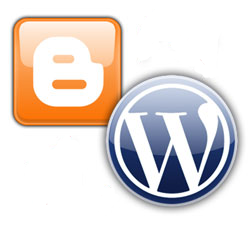This post will continue the steps that I took to convert my Blogger blog to a WordPress blog. In Blogger to WordPress – Part 1 I talked about installing WordPress on your local machine. This was done to help you learn WordPress and practice importing your Blogger data.
In this part I will talk about domain names and hosts, what they are and how they will be used during the conversion.
Domain Names

When you want to visit a web site you would type in a URL in your web browser’s address bar. Behind the scenes, the browser will send of a request to another server to find out the IP address associated with that URL. The IP address is a series of numbers that uniquely identifies a server on the Internet.
The URL you entered into the address bar contains a domain name. The domain name is in the form [domain name].[extension]. For example, the domain name for Technically Easy is technicallyeasy.net. One of the reasons domain names are used is because they are easier to remember than a series of numbers, such as with an IP address.
Before you can host your own WordPress blog you will need to purchase a domain name. Domain names are not expensive ($4-$10/year), and are purchased on a yearly basis. You can pay for several years at one time if you choose. There are many registrars where you can purchase a domain such as GoDaddy.
If you have not already used a domain with your Blogger blog, I recommend you do so. It will make your conversion much easier later, especially if you would like to keep your backlinks.
From my experience in the past, it seems Google indexes Blogger blogs very quickly, probably because Google owns Blogger. With a domain name, your blog will be listed in the Google index with that domain name, instead of [blog name].blogspot.com. Once you point your domain name to your WordPress blog, the links in Google will now send the visitors to your new blog.
With the domain name you can also use that domain with both your Blogger and WordPress blogs at the same time. The last section on this page will explain how you can do that.
Hosts
While WordPress does offer a free hosting site, you will want to host your own blog for full control. In this case, you will need to find a host.
A host simply houses your blog on a server, and you pay a fee to use their services. Many hosts can also help you register a domain name if you wish, or you can use an existing domain name. For Technically Easy, I had registered technicallyeasy.net before signing up with a host, so I just pointed the domain to the host.
There are several well-known hosts including Host Gator and BlueHost. Keep in mind that there is no perfect host, and some people may have had a bad experience with one, while others may have had good experiences. Just ensure your host provides the ability to create a WordPress blog. Most hosts do.
Once you have chosen a host, you should now point your domain to the host’s server. You will also need to point your domain to your Blogger blog. One domain pointing to two blogs can be done.
One Domain – Two Blogs
First we will setup your Blogger blog to use your domain name. There is some information about setting up your Blogger blog to use your domain name here:
- How do I use a custom domain name on my blog?
- How do I create a CNAME record for my custom domain?
What you will do with your blogger blog is redirect it to www.[your domain name].com (change .com to the extension of your domain name). Follow the instructions in the second link above to change the www subdomain of your domain to point to your Blogger blog.
If you have questions regarding this step, let me know by sending me an e-mail, which can be found in the about link at the top of this page.
Now with your Blogger blog redirected to the www subdomain of your domain, we will now point your WordPress to the main domain, such as [your domain name].com. This will allow a visitor to view both blogs with one domain name. Your host should have instructions on how to change your CNAME records for your registrar. If you having difficulty with this step, contact your host for assistance.
What will happen to the domain names once you convert to WordPress from Blogger? They will merge, as you will see in a future post.
By now you should have a domain name, a host, and two blogs. Next I will look at plugins and templates you can use with your WordPress blog, especially the plugins that will make your conversion much easier.
